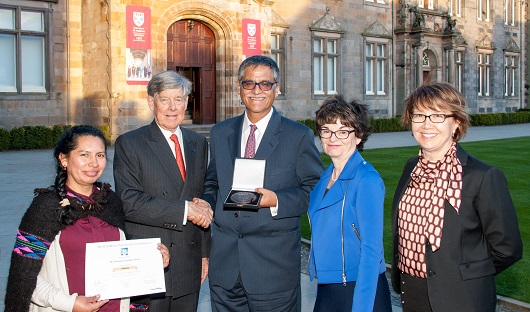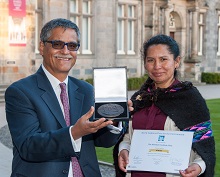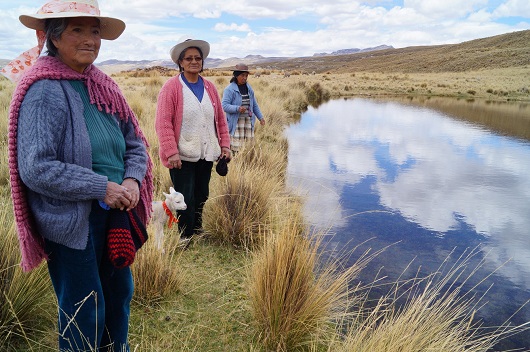St Andrews Prize for the Environment winner announced


A project which integrates 2000 years of indigenous knowledge of water management in the Andes with contemporary science and technology to create hybrid solutions that improve water security, support livelihoods, strengthen communities and increase ecosystem-wide resilience in mountain communities has won the St Andrews Prize for the Environment 2018.
Healthy mountain ecosystems help buffer the impacts of climate change for local communities, wildlife and downstream populations worldwide. Mountain people rely on their surrounding environment for water, food, pasture and the raw materials that are the foundation of their livelihoods. Further downstream, towns and cities depend on mountain water for drinking, agriculture and industry.
Efforts to manage, conserve or restore natural environments can help people adapt to climate change by taking advantage of a healthy ecosystem’s natural resilience.
 In 2013, The Mountain Institute, Peru began working with communities in the Nor-Yauyos Cochas Landscape Reserve affected by increasing water scarcity. They discovered the existence of a vast, complex and partially abandoned hydraulic system to manage water in the alpine high-plateau, or puna. Initiated as early as 100 BC, these systems were used extensively until about 1532. Through a complex system of dams and open earth canals, the systems increased soil and ground water storage, creating niche plant communities for camelid herds, and improved water supplies to irrigation systems.
In 2013, The Mountain Institute, Peru began working with communities in the Nor-Yauyos Cochas Landscape Reserve affected by increasing water scarcity. They discovered the existence of a vast, complex and partially abandoned hydraulic system to manage water in the alpine high-plateau, or puna. Initiated as early as 100 BC, these systems were used extensively until about 1532. Through a complex system of dams and open earth canals, the systems increased soil and ground water storage, creating niche plant communities for camelid herds, and improved water supplies to irrigation systems.
Based on the experience and evidence gained, the group propose to reduce the vulnerability of mountain communities to increasing water scarcity by restoring ancestral hydraulic systems and principles. Their objective is to increase the availability of tools, case studies, methods and information, as well as building and strengthening the capacities of networks of scientists and indigenous organisations, to co-design and implement the restoration of this ancestral water system.
At a ceremony at the University of St Andrews last night (Thursday 26 April), Dr Jorge Recharte Bullard, Director of the Andean Programme, The Mountain Institute, Peru was presented with the winning prize of US$100,000. He says:
“The Mountain Institute (TMI) is honoured to be the 2018 winner of the St Andrews Prize for the Environment. The award is recognition to the urgency to find solutions that, rooted in local cultures, secure mountain peoples’ water and livelihoods. Our project will expand now to cooperate with dozens of communities in the Andes to restore ancient water technologies and mountain ecosystems. This is recognition to the work of a network of partners who are part of this effort, like the International Union for the Conservation of Nature (IUCN) of which The Mountain Institute, Peru is a proud member. With the financial support that comes with the Prize, TMI will continue working with communities in the Nor-Yauyos Cochas Landscape Reserve, archaeologists and wildlife experts to scale-up the restoration of ancestral water technologies all over Peru and in other countries of the Andes in the future.”
The St Andrews Prize for the Environment is a joint environmental initiative by the University of St Andrews in Scotland, which attracts scholars of international repute and carries out world-class teaching and research, and independent exploration and production company ConocoPhillips. Recognising significant contributions to environmental conservation, since its launch in 1998 the Prize has attracted more than 5400 entries from around the world and donated approximately US$2 million to environmental initiatives on a wide range of diverse topics including biodiversity, sustainable development, urban re-generation, recycling, health, water and waste issues, renewable energy and community development.
Lord Alec Broers, Chair of the St Andrews Prize for the Environment Trustees, says: “This year was a very exciting and different year and I am thrilled that The Mountain Institute, Peru has been selected as the winner for the St Andrews Prize 2018. We have once again had a huge variety of submissions and it was terribly difficult for the Screening Committee and Trustees to select the final three projects. Hearing from each one of the finalists about the incredible work they have been doing is very humbling.

“This is my last year as Chair before I hand over the reins to Dr Hayaatun Sillem, Chief Executive of the Royal Academy of Engineering. As my ten years with the Prize comes to an end, I would like to thank everyone involved for their vision and commitment and for continuing to drive positive change and innovation. For me, it’s not about the past, it’s about the future – sustaining the environment has become an increasingly important theme in local, national and world politics and an increasingly central topic for people like me in engineering professions around the globe.
“This concept requires all of us to consider more widely than before the impact of our own lives and the infrastructure and products we produce, both geographically and temporally. I believe the projects we have supported across the 20 years of the Prize have all made a positive impact on the environment and have helped improve the living standards of communities living in some of the remotest and poorest regions of the world.”
Professor Sally Mapstone, Principal and Vice-Chancellor of the University of St Andrewssays: “For 20 years the St Andrews Prize for the Environment has shone a light on hundreds of the brightest ideas and projects across the globe dedicated to tackling environmental problems, empowering communities and creating a more sustainable way of life.
“Our ongoing partnership with ConocoPhillips is an example of the way academic institutions, by working with industry and wider society, can change lives for the better.
“The University of St Andrews is home to world-leading research on environmental issues and we are committed to playing our part in addressing global concerns and reducing the environmental impact of our own activities.
“I wholeheartedly congratulate this year’s winners, The Mountain Institute, Peru, and look forward to following their progress.”
Terri King, President, UK for ConocoPhillips, says: “Protecting terrestrial and marine plant and animal species and ecosystems is essential for ConocoPhillips operations and it is a key component of our sustainable development commitment, position and actions. We also recognise that fresh water is a limited resource in some parts of the world and its availability may change in the future. This is why sponsorship of the St Andrews Prize for the Environment is so important to ConocoPhillips with all three of this year’s finalists playing their part in directly supporting marine conservation or improving water security thus supporting livelihoods whilst protecting eco-system-wide resilience.
“Congratulations to this year’s winner and finalists – I look forward to hearing how you use the prize money and network to extend the reach of your activities.”
Picture captions
Top (left to right): Doris Chávez Osorio, The Mountain Institute, Peru, Lord Alec Broers, Chair of the Board of Trustees, Dr Jorge Recharte Bullard, The Mountain Institute, Peru, Professor Sally Mapstone, Principal and Vice-Chancellor, University of St Andrews and Trustee, and Terri King, President UK, ConocoPhillips
Middle (left to right): Dr Jorge Recharte Bullard and Doris Chávez Osorio of The Mountain Institute, Peru
Bottom: The Mountain Institute project, Peru
This year’s runners-up, each presented with a cheque for US$25,000 were:
TEDs in Malaysia – Fishing Industry Incentives for Turtle Conservation
Marine Research Foundation’s (MRF) project seeks to broker relationships between leading hotel chains and shrimp fishers to catch turtle-free shrimp.
Shrimp trawl fisheries have been identified as one of the leading causes of sea turtle declines in Malaysia, and around the world. Despite ongoing protection of nesting beaches, transfer of eggs to hatcheries and awareness campaigns, Malaysian sea turtles continue to face worrying declines. MRF and the Department of Fisheries Malaysia believe that the reduction of the by-catch of sea turtles is a critical step in ensuring their survival in the country.
Large numbers of sea turtles are killed by shrimp trawl fishers in developing countries each year. The use of Turtle Excluder Devices (TEDs) can reduce turtle catch by more than 98 per cent, but fishers remain sceptical about their use for fear of losing catches. TEDs also reduce fuel costs (less unwanted material in the nets), increase product value (less damage to shrimp) and reduce down-time (less damage to the net). The major problem with uptake is not their functionality, but their perceived functionality, coupled with lack of incentives for use.
MRF’s goal is to reduce the incidental capture and mortality of sea turtles in Malaysia by educating and incentivising fishing communities to use TEDs. Their plan is to link fishers with international hotel chains that are keen to promote the use of sustainable seafood, particularly turtle-free shrimp. They will pay a small premium to fishers (in addition to the cost of the shrimp) for them to supply sustainable seafood to the hotels, enhancing the image of the fisher and the end-buyer.
Long-term solutions to sustainable fishing lie in the hands of fishermen, buyers and consumers. Some people find it economically challenging to make choices based on environmental efforts, just as businesses do not waste capital on unsuccessful ventures. By bridging the two ends of the spectrum, MRF aims to incentivise fishers and satisfy consumers.
Net-Works – Empowering Communities, Replenishing the Ocean
Net-Works improves the lives of marginalised coastal communities living in biodiversity hotspots of developing countries. They do this by redesigning global supply chains to create sustainable and scalable solutions for reducing marine plastics and increasing fish stocks.
Net-Works’ case for change spells out their view that on the current trajectory of plastics pollution and overfishing, there will be one tonne of plastic for every three tonnes of fish in the ocean by 2025. The people most affected are those in marginalised rural communities within biodiversity hotspots of the developing world. This is especially true in Southeast Asia, the centre of marine biodiversity, which Net-Works found contributes more than 60 percent of the world’s marine debris, contains 55 per cent of the global population of artisanal reef fishers, and suffers the highest level of fishing pressure.
Community-based Marine Protected Areas (MPAs) with No-Take Zones (NTZs) and mangrove rehabilitation areas are key for restoring coastal ecosystems and enhancing socio-ecological resilience. Though there are over 1,500 MPAs in the Philippines, these are often too small to be effective due to the high dependence of communities on fishing. They are also too dependent on donor funding cycles and typically focus on coral reefs without capturing critical seagrasses or mangroves.
Net-Works’ simple, scalable and holistic model applies the principles of fair trade and inclusive business, creating efficient community-based supply chains for raw materials including plastics and seaweed carrageenan.* By increasing income from seaweed, this reduces the community’s dependence on fishing, enabling them to set aside larger NTZs.
The raw materials are sold into global supply chains, giving international brands the opportunity to source premium products with a positive social and environmental story. This gives fishing communities a more transparent and dependable price and provides sustainable funding sources for local conservation and development. Net-Works also sets up community banks, which bring communities together into informal cooperatives and provide much-needed access to financial services. This enables members to invest in their sustainable livelihoods and build a Net-Works conversation constituency.
*Carageenans – a family of linear sulphated polysaccharides extracted from red edible seaweeds that are widely used in the food industry for their gelling, thickening and stabilising properties.
The full list of previous winners and further details about the Prize are available online. You can also follow the Prize on Facebook.
Notes: In 2018, the St Andrews Prize for the Environment is awarding its 20th winner. Submissions are assessed by a panel of Trustees representing science, industry and Government. The award goes to the project that the Trustees believe displays the best combination of science, economic realism and sustainability.
Category Awards